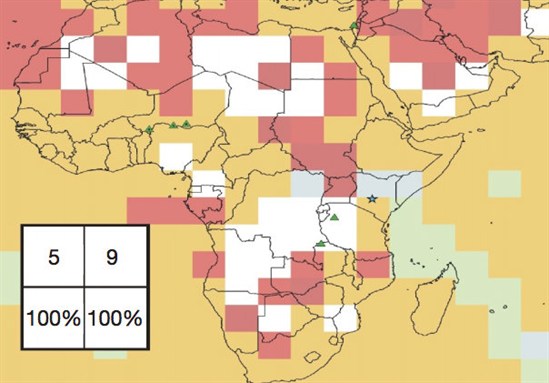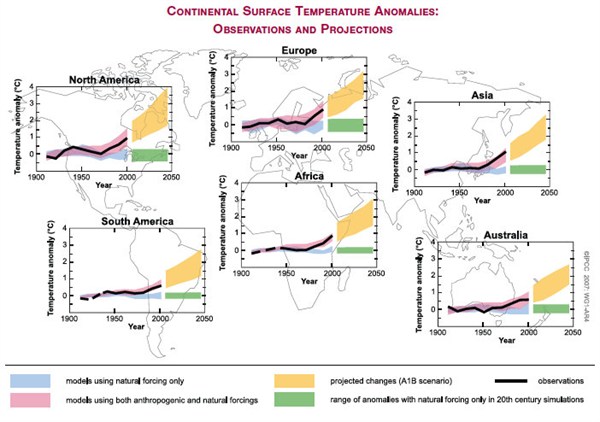In the final episode of the BBC's Africa documentary, broadcast last week, veteran nature presenter Sir David Attenborough said that "some parts of the continent have become 3.5 degrees Celsius hotter in the past 20 years".
This prompted a fair bit of discussion, and rightly so - the BBC has since called the statement "disputable" and removed it from repeats of the programme. But if the BBC got it wrong, what could it have said? Here we look through the scientific literature to find some material the BBC could have used instead.
The issue came to light with a flurry of inquisitive Twitter users expressing surprise at the 3.5 degree claim shortly after the programme aired last Wednesday. The Guardian's Leo Hickman took a closer look with a blog post headlined 'BBC exaggerated climate change in David Attenborough's Africa' - and the story was widely picked up in other papers. The Times, the Telegraph and the Daily Mail all covered the story yesterday - the latter calling the episode "an embarrassing climbdown over climate change claims".
The BBC swiftly removed the offending phrase from Sunday's repeat, with the admission that Attenborough's words "should have been more carefully scripted". All that remains in the programme as broadcast is a rather vague statement that "Africa's climate is certainly changing".
First hurdle
Looking for temperature trends across Africa is not like looking for trends in the UK or elsewhere in the Northern Hemisphere. Temperature measurements are only quite patchy across the continent, and where measurements do exist they don't extend very far back in time.
With temperature data only available for relatively short periods of time, it's harder to spot long term changes - or trends. And gaps in the geographical coverage make it hard to see how widespread any detected trends are.
So what does the scientific literature say about temperature rise in Africa? Dr Tim Osborne, climate scientist at the University of East Anglia, told the Guardian that the retracted BBC statement probably came from a 2008 paper by Cynthia Rozensweig, a climate scientist working at NASA. Let's start by looking at what that paper says.
At least two degrees, but not necessarily 3.5
Below is a graph from the Rozensweig paper showing how observations of temperature across Africa changed between 1970 to 2004. The continent is split up into boxes, each with a colour representing the level of warming. The graph covers a 35-year period, not the 20 years the BBC talked about. The graph does show how patchy the data record is - white squares indicate missing data.

Source: Rozensweig et al. (2008)
The light red squares show places that have warmed between one and two degrees over 35 years. It's hard to distinguish between light red squares and dark red ones, which represent the highest level of warming. But the graph seems to show only a handful of dark red squares where temperatures have risen more than two degrees.
As Osborn told Hickman, the map uses the same colour - dark red - for all warmings between two and 3.5 degrees Celsius. We asked Osborn for a bit more detail, and he told us this could be "where the BBC had got the 3.5 degrees Celsius figure (i.e. by assuming that some of those regions had reached the 3.5 degrees Celsius mark)."
So based on the data in this paper, what should the BBC have said instead?
Osborn told us:
"[M]y conclusion from the Rosenzweig et al. map is that it indicates some African regions had warmed by at least two degrees Celsius over a 35-year period".
As for the 20-year time frame, it seems BBC producers got confused between the conclusions of the Rozensweig paper and claims about 3.5 degree warming in a Christian Aid report from 2006, repeated in a 2006 publication by Oxfam and the New Economics Foundation.
Page 30 of the Christian Aid report says:
"[T]he maximum temperature in Kericho, a highland area in the Rift Valley province where most of Kenya's tea exports are grown, has increased by 3.5?C during the past 20 years."
This particular claim doesn't seem to be have been published in a peer-reviewed journal and cannot be verified so far.
What does other literature say?
An analysis by Professor Mike Hulme from the Tyndall Centre for Climate Change Research at UEA suggested Africa has warmed at a rate of 0.1 degrees Celsius per decade throughout the twentieth century - although not uniformly across the continent. A more recent study in the Journal of Climate put the figure at 0.16 degrees per decade over the satellite era, which means since 1979.
Every five or six years, the Intergovernmental Panel on Climate Change (IPCC) produces an in-depth assessment of the state of research in all areas of climate science, from precipitation patterns to polar ice melt. A quick scan of the IPCC's 2007 report would probably have led the BBC researchers to the graph below.
For Africa as a whole, it shows around a one degree temperature rise since 1900 - the black line in the middle lower panel. This rate of temperature rise is higher than the global average, which is about 0.76 degrees since the start of the 20th century.
?
Source: Regional scale projections from the IPCC's 4th Assessment Report
The IPCC notes that Africa is likely to warm faster than the global average in the 21st century. The 2007 report says:
"In all four regions and in all seasons, the median temperature increase [between the years 2080 to 2099 and the years 1980 to 1999] lies between three degrees Celsius and four degrees Celsius, roughly 1.5 times the global mean response."
The IPCC's Summary for Policymakers also contains some top line conclusions about the vulnerability of African ecosystems to drought:
"It is estimated that, by the 2080s, the proportion of arid and semi-arid lands in Africa is likely to increase by five to eight per cent. Ecosystems are critical in Africa, contributing significantly to biodiversity and human well-being. Between 25 and 40 per cent of mammal species in national parks in sub-Saharan Africa will become endangered."
Published literature about African temperature trends may be a little thinner on the ground than in other parts of the world. But peer-reviewed research looking at the impact of climate change on the continent does exist in the scientific literature. The BBC's Africa programme was an otherwise enlightening and elegantly told story of the African continent. What this episode suggests is that slightly more attention to referencing would have served the programme better.
what time does the super bowl start super bowl 2012 josephine baker ben gazzara nfl hall of fame 2012 ufc diaz vs condit super bowl start time
No comments:
Post a Comment
Note: Only a member of this blog may post a comment.